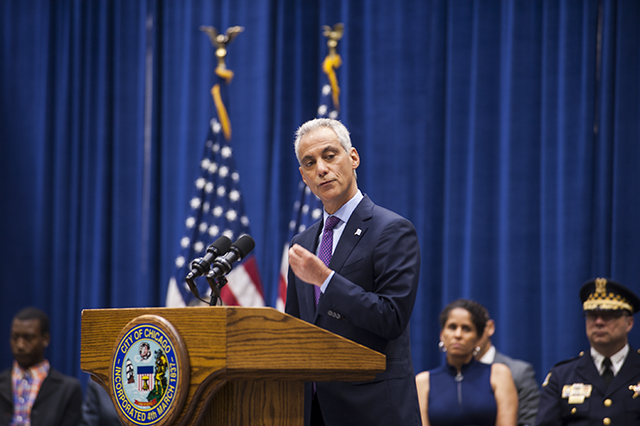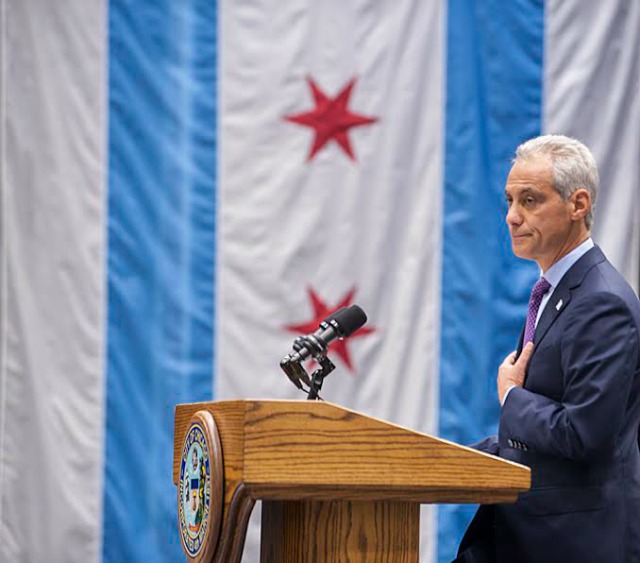Rahm's Anti-Crime Speech Leaves Aldermen, Residents Unimpressed
By aaroncynic in News on Sep 23, 2016 11:15AM

Mayor Rahm Emanuel outlined his plan to address Chicago violence Thursday evening to a few hundred people in a gymnasium at Malcolm X College.
"For all the things that make Chicago great, for all the things that make us proud to call ourselves Chicagoans, the violence that is happening corrodes our core," Emanuel told the crowd. "It is not the Chicago we know and love."
Emanuel—who several times switched from appearing to choke up to pounding his fist on the podium—attempted to walk a fine line between his plan to add more police to the city streets and addressing the issues communities have with the force.
“Respect is a two-way street,” said Emanuel. "There cannot be a permission slip for people to taunt officers who are trying to solve crime in their community. We as a city have to have zero tolerance for that. Also, there can be no pass for an officer to be dismissing a resident who was recently robbed and turned to them for help. Both situations were caught on video and if we’re going to be where we need to be, that is not allowed and can’t be accepted as a norm.”
The mayor’s speech outlined what he dubbed the “four p’s,” standing for policing, punishment, prevention and parenting. He leaned heavily on getting guns off the streets, mandatory-minimum sentencing and gang activity.
“We need to stop the revolving door for repeat violent offenders,” he said, later adding “making sure that the most dangerous offenders receive appropriate sentences is an important step, but we also must do more to keep guns out of the wrong hands in the first place.”

Rahm Emanuel / Photo: Aaron Cynic
While referencing the names of several people recently gunned down in Chicago—including Nykea Aldridge, who was shot and killed while pushing a baby stroller—Emanuel did not bring up other incidents where the Chicago Police had shot and killed individuals, with the exception of a brief mention of Laquan McDonald.
“We all know that this partnership has been tested in Chicago. It is a problem that has festered in this city for decades,” said the mayor.
Though he spent some time talking about “prevention and investment” in Chicago’s neighborhoods, Emanuel’s speech had few details about how exactly those items would play out. Furthermore, much of what he said seemed very familiar to other speeches he made in previous years. The mayor chose not to acknowledge the roles that massive closures of public schools and neighborhood mental-health clinics may play in violence.
“I didn’t feel we moved the needle forward on school issues, on the lack of jobs, mental health issues. And those were all things that his policies kind of put us in this position we’re in now,” said Alderman Scott Waguespack.
“We have to acknowledge how we got here,” Waguespack continued. “You don’t just ignore what policies you had in place for the last few years. You start out by saying things that we’ve been doing haven’t worked, and we should focus on something that does work. I’m not convinced the four p’s are gonna be the solution.”
Others were also less than impressed by Emanuel’s speech.
Jonathan Todd, who stood with a group of protesters outside Malcolm X College and has lived on the West Side for most of his life, said that he felt the speech was mostly theatrical.
“None of these agencies (mentioned by Emanuel) are doing the work in the community,” said Todd. “This is all fluff. We don’t have a way of paying for this type of stuff. He earmarked money we don’t even have.”
The mayor also failed to address larger structural issues, according to Todd. “This problem is based on poverty,” he said. “Close those schools, no economic development, no infrastructure, you’re gonna get crime. They know it.”
Public policy consultant, community organizer and former mayoral challenger Amara Enyia also took Emanuel to task, saying “it’s easy for him to deflect all responsibility for violence in this city on police or community members while conveniently sidestepping the fact that his administration has been at the helm of public policy failings that have directly contributed to the breakdown of the very fabric of so many parts of this city—of which rampant violence is the manifestation.”
In fact, the biggest failure of Rahm’s speech is that, while name dropping a few tragic stories with which Chicagoans are all too familiar, nothing much of what he said can begin to address the structural problems we’ve faced for decades. Building a Starbucks, Whole Foods or Jimmy Johns in Englewood within a year won’t solve the issues that have plagued the neighborhood for decades.
Until he can offer more specifics and accept more accountability, Emanuel’s words will remain just that: words.